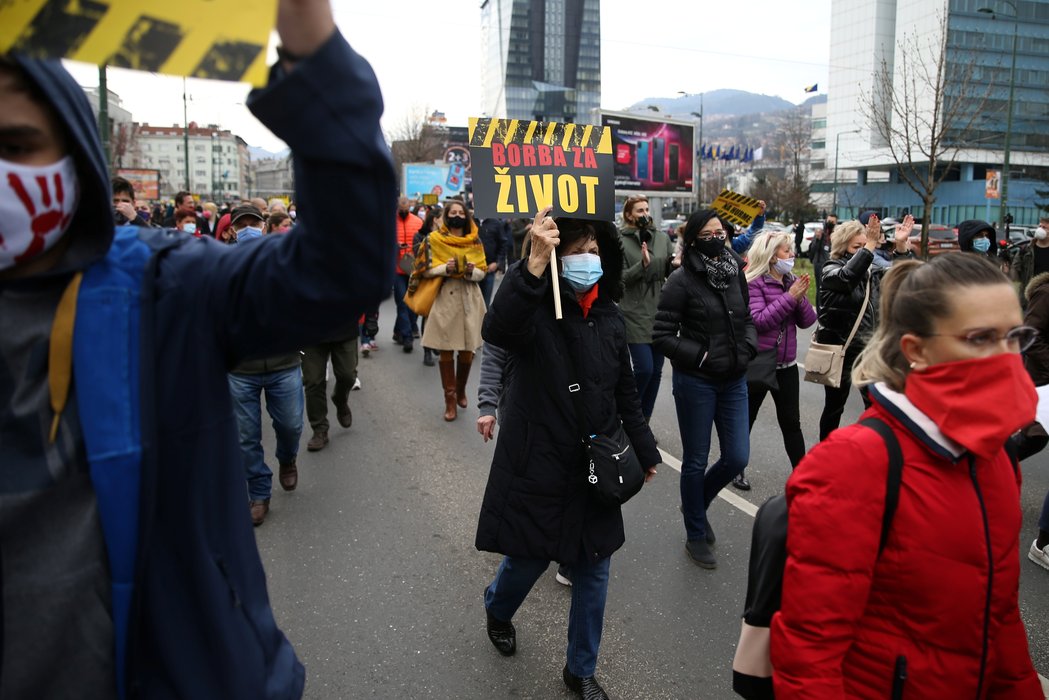
Association
The Balkan Civil Society Development's (BCSDN) annual Monitoring Matrix report on the enabling environment for civil society development in the Western Balkans in 2020 notes that, in BiH, workers, particularly in the private sector, face immense obstacles and harassment for attempting to organise collectively and establish trade unions, eventually giving up the registration of an association. In addition, it notes that an increasing number of CSOs have either been formed or indirectly controlled by political parties and public officials, and thus have been misused to divert public funds for the private interests of politically affiliated officials.
Peaceful Assembly
On 15th July 2021, more than 200 citizens gathered in front of the State Prosecutor’s office in Sarajevo to protest the arrest of Bosnia’s chief of intelligence Osman Mehmedagic. The protesters claim that the indictment is politically motivated and orchestrated by the leaders of the Bosnian Serbs and Croats, Milorad Dodik and Dragan Covic. Mehmedagic is under investigateion for abuse of office, forgery of documents and money laundering.
The 2019-2020 Alternative Report on the Application of BiH for the EU Membership raises the problem of lengthy notification procedures for staging protests. It notes the bad practice of approving moving assemblies through verbal permissions (organisers notified by telephone or through interviews with police) needs to be changed, and that the organisers should be informed in writing about the approval of a moving assembly. In addition, it also highlights other challenges faced by citizens and CSOs during the past two years.
Expression
Calls to improve whistleblower law
The International Day of Whistleblowers and Persons Reporting Corruption was marked by Transparency International BiH noting that only every tenth whistleblower in Bosnia and Herzegovina can use legal protection mechanisms due to the current laws. It added that the Law on Protection of Persons Reporting Corruption has not yet been adopted in the Federation of Bosnia and Herzegovina, and called on members of the FBiH Parliament and political leaders to adopt this law as soon as possible. In addition, it called for an improvement to the legal regulations at the level of Republika Srpska and Bosnia and Herzegovina by expanding the definition of corruption, to protect all persons who report irregularities related to corruption or threats to public health or environmental protection.
Obstructing the work of journalists
The Association of Bosnian Journalists expressed concern over what it perceives to be an excessive fine received by the online magazine Žurnal for libel. Selvedin Avdic and Eldin Karic, editors of Žurnal, were fined 170,000 KM (87,000 Euro) by the Sarajevo court after being sued by Gordan Memi and his company, who were the subject of an article. The publication alleged that Memi was linked to international drug dealing networks. The association claims that the fine is disproportionate and could result in the shutdown of the outlet itself, adding that the practice of heavy fines threatens media freedom and investigative journalism.
According to a report by BIRN, judicial institutions in Bosnia refuse access to information to journalists and citizens if requests for such information are made via email, adding that this is a severe limitation for the work of reporters and undermines transparency. According to the courts and prosecutors’ offices, this is due to the lack of electronic seal law and the inability to establish the identities of the people behind the email. Bosnia is the only country in the Balkans that does not offer access to public records in electronic form.
Related to challenges faced by journalists, a report: “Indicators of the levels of media freedom and safety of journalists in BiH 2020”, released in July 2021, found that in the previous year there have been 26 cases of attacks, threats and pressure on journalists, including three physical attacks and six death threats. According to the author of the report, Maja Radevic, Bosnian politicians are increasingly intent on controlling editorial policy and influencing media content. They are also the main source of libel lawsuits against journalists, with 80 percent of lawsuits coming from functionaries and politicians.
“Politicians are very active in trying to control editorial policies and create media content. It is particularly worrying that there is less and less talk about the public reputation of the media and the preservation of their independence. The impression is that many journalists, owners and editors of the media have 'reconciled' with political influences and pressures,” - Maja Radević of the Association of BH Journalists.
In an unrelated development, a conference organised by the Sarajevo Open Center stressed that hate speech on any grounds is a common occurrence in Bosnia and Herzegovina. Apart from political discourse, it is mostly present in media content, especially in the online sphere, and the absence of sanctions sends a message to citizens that hate speech is common and "normalised". A recent study showed that from October 2018 to October 2020 there was not a single day where hate speech was not present in the media in BiH, which is one of the many indicators of the urgent need to establish stronger mechanisms to combat hate speech.